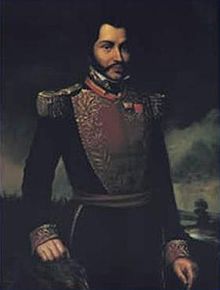José Francisco Bermúdez
José Francisco Bermúdez (born January 23, 1782 in San José de Areocuar , † December 15, 1831 in Cumaná ) was a general in the Liberation Army and Commander-in-Chief of the Army of Venezuela .
Military career
Bermúdez joined the patriot army in 1810 and was promoted to lieutenant in 1812 and sent to a campaign in the province of Barcelona . After Francisco de Miranda's surrender in July 1812, he fled to Trinidad .
First win
Here he took part in the meeting that Santiago Mariño had called for the Venezuelans in exile to proclaim the reconquest. In 1813 he was represented in various landing operations in eastern Venezuela, which should lead to the reconquest of Venezuela. In February, he won at Irapa (Peninsula Paria one in Ostvenezuela) battle against a numerically superior enemy.
promotion
In 1814 he was promoted to colonel and served in the reserve under General Mariño, whom Simón Bolívar ordered to assist him. In that year he fought in a number of battles, but neither could Bolívar prevent the fall of the Second Republic . In Aragua de Barcelona, in mid-August, he did not submit to Bolívar's orders, resulting in the murder of thousands of civilians who had fled Caracas by Francisco Tomás Morales after the defeat.
Via Margarita , the Antilles and Cartagena , where he temporarily led the defense of the city against the Spanish expeditionary army of Pablo Morillo, he fled to Haiti in 1815 , where he met Bolívar without joining him in his campaign of reconquest. It was only much later that he was able to shed his resentment against Bolívar because of the loss of the Second Republic.
Liberation struggles
In November 1816, Bermúdez rejoined Mariño in Güira and accompanied him on his campaign in eastern Venezuela, in opposition to Bolívar. After Bolívar was relieved in the eastern Venezuelan city of Barcelona (February 9, 1817), the province of Guyana was liberated , and he became its military commander in chief . When Mariño finally submitted to Bolívar and withdrew on the penultimate day of 1817, Bermúdez became Commander-in-Chief of the Eastern Army and received instructions with General Rafael Urdaneta to secure Barcelona and Cumaná. On September 13, 1818, he suffered a defeat on the Río Caribe and had to retreat to Cumaná , pursued by the royalists .
Carabobo

In 1821, as part of the Carabobo campaign , Bermúdez took part in the attempt at diversion aimed at splitting up the Spanish troops . He began this operation on April 28th after a few successful skirmishes. On May 14th he entered Caracas , after he had crushed the garrison of Caracas, which had marched against him, on the 12th east of Guatire. On the 18th he broke south into the valleys of Aragua because he could not defend the city against the advancing Spaniards under Morales. After the campaign ended at the Battle of Carabobo on June 24th, 1821 , he was sent to Cumaná as commander-in-chief of the armed forces in the east of the country, which had been stubbornly held by the royalists since the loss of the Second Republic. On September 16, this last bastion of the Spaniards in eastern Venezuela fell, decisively shaped by his efforts.
Maracaibo and Riohacha
To drive Francisco Tomás Morales from Maracaibo and Riohacha he was sent again in July 1823. He was also involved in the Puerto Cabellos case on November 10; it was the last Spanish base in Venezuela. After his return to Cumaná in December, he held the position of military commander of the Orinoco province .
Retirement and end
Twice more, first in 1828, he had to put down an uprising near Cumancoa , then from January to August 1830 opponents of the constitution had to be pacified again. Then he retired.
A year later, Bermúdez was killed in a political assassination attempt in Cumaná . In 1877 his remains were buried in the Panteón Nacional in Caracas. The Jose Francisco Bermúdez Airport west of Carúpano was named after him.
Sources and Links
- Wikipedia Spanish
- Biografías, José Francisco Bermúdez de Castro y Figuera de Cáceres ( Memento from February 21, 2013 in the web archive archive.today )
- José Francisco Bermúdez de Castro y Figuera de Cáceres ( Memento from February 21, 2013 in the web archive archive.today )
- venezuelatuya
- Bermúdez, José Francisco ( Memento from April 22, 2013 in the web archive archive.today ) Universidad de los Andes, Merída
- Diccionario de Historia de Venezuela
- Orientweb
Bermúdez fought from beginning to end in Venezuela, only expelled from the arrival of the expeditionary army to Cartagena in Colombia in 1815 and involved with Bolívar in Haiti and its landings in the following year, more of his missions can be found in the Venezuela sections of this summary.
Individual evidence
- ↑ Pérez Tenreiro, Tomas (1968): Los Generales en jefe de la independencia (rasgos biográficos). Ministerio de la Defensa. Caracas.
- ^ Romero Martínez, Vinicio (1987): Mis mejores amigos. 110 biografías de venezolanos ilustres. Editorial Larense, CA Caracas. 188p. ISBN 980-211-120-1
- ↑ Hernández Caballero, Serafín (editor). 1998: Gran Enciclopedia de Venezuela. Editorial Globe, CA Caracas. 10 volumes. ISBN 980-6427-00-9 , ISBN 980-6427-10-6
- ↑ Stefan Beck: Independence . skb-s- Amerika.de. Retrieved May 27, 2019.
| personal data | |
|---|---|
| SURNAME | Bermúdez, José Francisco |
| BRIEF DESCRIPTION | Venezuelan general |
| DATE OF BIRTH | January 23, 1782 |
| PLACE OF BIRTH | San José de Areocuar , Venezuela |
| DATE OF DEATH | December 15, 1831 |
| Place of death | Cumaná , Venezuela |

